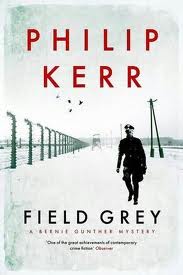Philip Kerr: FIELD GREY. Four Stars
A Pawn in the Great Powers’ Chess Game
In BERLIN NOIR, the trilogy that begins Kerr’s Bernie Gunther series, we are introduced to Bernie Gunther in the pre-war Nazi-era Berlin, and then we see him again shortly after the war ends. Fifteen years, and many other (non-Bernie) books later, Bernie Gunther returned in THE ONE FROM THE OTHER, set in 1949. The next book, A QUIET FLAME, finds Bernie on the run in 1950 and living in Argentina under an assumed name.
These first five novels in the Bernie Gunther saga made me wonder about Bernie in the years before the Nazi assumption of power and what Bernie was doing during the war. In the sixth novel in the series, 2009’s IF THE DEAD RISE NOT, we learn the answer to the first question. The book begins with Bernie having left Argentina for pre-Castro Havana, but it then flashes back to Berlin in 1934, as the Nazis consolidate their power.
Now, in FIELD GREY, the seventh novel in the series, we see what Bernie did during the war, during the chaos of the immediate postwar period and in 1954, when he is spirited back to Europe and made a pawn in the deadly espionage games of the various spy agencies engaged in the Cold War.
In recent years, long-secret documents about Russian activities during WW2 and the actions of the East German secret police before the fall of the Berlin Wall have been made available. It is apparent that Philip Kerr has some familiarity with the the history revealed by those documents. This book is packed with information about so-called police actions in eastern Europe during the war, the treatment of German POWs by the Russians, the Russians’ treatment of their own returning POWs and the machinations of the victorious Allied powers as the joy of defeating the Nazis gave way to the Cold War struggle for advantage in Europe, particularly in Germany.
Bernie Gunther is in the thick of these historic events. He is an intelligence officer and part of a police battalion during the war, a prisoner of the Soviets in several nightmarish camps, imprisoned again in France, and then a reluctant field agent for both the French and US intelligence services.
A thread running through all of Bernie’s history in FIELD GREY is Erich Mielke, a communist Bernie saved from death by a Nazi gang in the 1930s. Mielke is then accused of murdering two Berlin policemen and flees to the Soviet Union. He later crosses paths with Bernie when he is interned in southern France after the Spanish Civil War, again when Bernie is a POW and yet again when Bernie has been put into play by the CIA in 1954.
Although the product description of FIELD GREY would have you believe that the book is about Bernie’s mission to capture a French war criminal called Edgard de Boudel, that is a very minor part of the book’s plot. The plot is much more about the years-long chess game between Bernie and Mielke, and Bernie’s role as a pawn in the ambitions of one power after another: the Nazis (particularly Reinhard Heydrich), the Soviets and the intelligence services of France, the Soviet Union and the US.
The story is enthralling, though I have to deduct one star for the confusing way the story jumps from one time and place to another, and for some lack of clarity in the description of the double- and triple-crossing of the various players in the spy games. Anyone who has enjoyed the previous Bernie Gunther books and who has an interest in the historical events described should find this a worthwhile read despite these flaws. I’m looking forward to finding out more of Bernie’s history.
FIELD GREY was published in the UK in October, 2010 and will be published in the US (under the title FIELD GRAY) on April 14, 2011.
 Maine Colonial provides not only a review of FIELD OF GREY, due to be published in the United States in April, but she also includes an overview of the Bernie Gunther series set in Germany during the rise and fall of the Third Reich
Maine Colonial provides not only a review of FIELD OF GREY, due to be published in the United States in April, but she also includes an overview of the Bernie Gunther series set in Germany during the rise and fall of the Third Reich